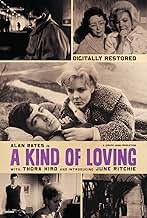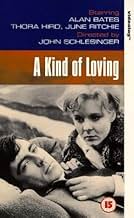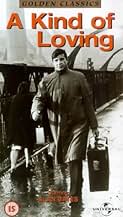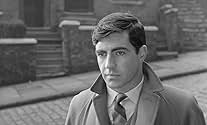CALIFICACIÓN DE IMDb
7.3/10
2.8 k
TU CALIFICACIÓN
Después de casarse con su novia por que ella quedó embarada, un joven debe adaptarse a su nueva vida y lidiar con su suegra.Después de casarse con su novia por que ella quedó embarada, un joven debe adaptarse a su nueva vida y lidiar con su suegra.Después de casarse con su novia por que ella quedó embarada, un joven debe adaptarse a su nueva vida y lidiar con su suegra.
- Dirección
- Guionistas
- Elenco
- Nominada a4premios BAFTA
- 1 premio ganado y 4 nominaciones en total
- Dirección
- Guionistas
- Todo el elenco y el equipo
- Producción, taquilla y más en IMDbPro
Opiniones destacadas
alongside Saturday Night & Sunday Morning and a Taste of Honey this is a great companion piece. Alan Bates is superb as a draughtsman in a busy factory and June Ritchie brings a tender portrayal as the object of Vics(Bates) desire. Thora Hird as the mother in law from hell is quite frightening and her scene with Vic Brown being sick behind her sofa is a classic. you filthy pig you filthy disgusting pig
You can feel her loathing. Some great support from Jack Smethhurst and the always excellent James Bolam. The scene that I favour is where Vic is getting bored with his situation and tries to get sympathy from his sister, his sister suddenly turns on him and tells him to get his life sorted, made bed lie on it etc. An absolutely fantastic slice of early 1960,s life.
You can feel her loathing. Some great support from Jack Smethhurst and the always excellent James Bolam. The scene that I favour is where Vic is getting bored with his situation and tries to get sympathy from his sister, his sister suddenly turns on him and tells him to get his life sorted, made bed lie on it etc. An absolutely fantastic slice of early 1960,s life.
There's a frustrated young man, name of Vic, from a pool of young ladies he's picked, Ingrid Rothwell's her name, with a blonde flowing mane, she's the lass with whom he wants to tick. Ingrid's just as fond of this lad, now he's making advances she's glad, but he runs hot and cold, wants to do more than hold, so she lets him explore and un-clads. No surprise as nature takes its course, with a marriage hastily brought forth, which Vic starts to abhor, lives with Mother-in-Law, and his compass no longer points north.
Great dialogue, great performances, in a perpetually told tale of the ages, where the outcomes invariably reflect the times when the drama takes place, and leave you grateful for the times you live in today - I think it's called progress.
Great dialogue, great performances, in a perpetually told tale of the ages, where the outcomes invariably reflect the times when the drama takes place, and leave you grateful for the times you live in today - I think it's called progress.
I own very few movies - this is one of them. I've seen it many times and am always moved.
It is of course part of the special "Angry Young Man" genre that includes Billy Liar, The Loneliness of the Long Distance Runner, The Entertainer, Darling, A Taste of Honey, This Sporting Life, Look Back in Anger, Room at the Top, Saturday Night and Sunday Morning - and in later years, In Celebration and The Homecoming.
Such novelists/playwrights as John Braine, Alan Sillitoe, David Storey, John Osborne, Arnold Wesker, John Wain, Shelagh Delaney, directors like Karel Reisz, John Schlesinger, Lindsay Anderson and Tony Richardson, and such screenwriters as Waterhouse and Hall (who wrote this as Billy Liar).
The movies are primarily about men trapped by place and morality -- and either lashing out/escaping or trying to accommodate themselves to their situation. Most are set in the north of England - all are about people from working class backgrounds.
Stars like Richard Harris, Julie Christie, Alan Bates, Ian Holm, Albert Finney, and Tom Courtenay broke in their film teeth with these movies - and others such as Richard Burton, Lawrence Olivier, Laurence Harvey and Dirk Bogarde revealed their expansive range.
The protagonists are often not likable - certainly the pitiful Archie Rice in The Entertainer, Burton's character in Look Back in Anger, Finney's in Saturday Night and Sunday Morning, Courtenay's character in "Long Distance Runner" or Richard Harris' character -- are all people you'd rather not accompany on a long train journey.
However, Vic Brown, the protagonist in this one - is largely sympathetic (and wonderfully written and portrayed). His plight is just so realistic - and the consequences so easy to believe.
There are many things that our lad gets wrong - unable to break things off with a woman, he simply ignores her (and speaks badly of her to others) - yet is helpless when she suggests they get together again. In part, this is because his lust masters him - and in part because he just can't bear to tell someone he no longer wants to see her.
As awful as most audiences will find Ingrid's mother (wonderfully played), one can also have sympathy for her - a widow overly protective of her only child, and the circumstances in which her child finds herself.
The modesty of the characters is wonderful yet not overly done - it is the characteristic that yields immense sympathy in the viewer - this is especially true of the Brown family - from "our Christine" and her gentle husband to Vic's wonderful father and brother to his forceful mother.
Most of the reviews speak of this very much as a look back in time - I think it's not so past.
The themes are universal and timeless: lust and its consequences, indecision about a romantic partner, the division between a young person's caution about taking the right steps in life and closeness to family vs. inchoate yearnings to do great things far away - these are the stuff of such plays as The Fantasticks and such movies as It's a Wonderful Life. (Donna Reed's character wanted Jimmy Stewart's no less than Ingrid wanted Vic - and both men had dreamt to be far away doing great things).
This is wonderful - it will strike anyone as sharply observed, wonderfully written - and very moving.
It is of course part of the special "Angry Young Man" genre that includes Billy Liar, The Loneliness of the Long Distance Runner, The Entertainer, Darling, A Taste of Honey, This Sporting Life, Look Back in Anger, Room at the Top, Saturday Night and Sunday Morning - and in later years, In Celebration and The Homecoming.
Such novelists/playwrights as John Braine, Alan Sillitoe, David Storey, John Osborne, Arnold Wesker, John Wain, Shelagh Delaney, directors like Karel Reisz, John Schlesinger, Lindsay Anderson and Tony Richardson, and such screenwriters as Waterhouse and Hall (who wrote this as Billy Liar).
The movies are primarily about men trapped by place and morality -- and either lashing out/escaping or trying to accommodate themselves to their situation. Most are set in the north of England - all are about people from working class backgrounds.
Stars like Richard Harris, Julie Christie, Alan Bates, Ian Holm, Albert Finney, and Tom Courtenay broke in their film teeth with these movies - and others such as Richard Burton, Lawrence Olivier, Laurence Harvey and Dirk Bogarde revealed their expansive range.
The protagonists are often not likable - certainly the pitiful Archie Rice in The Entertainer, Burton's character in Look Back in Anger, Finney's in Saturday Night and Sunday Morning, Courtenay's character in "Long Distance Runner" or Richard Harris' character -- are all people you'd rather not accompany on a long train journey.
However, Vic Brown, the protagonist in this one - is largely sympathetic (and wonderfully written and portrayed). His plight is just so realistic - and the consequences so easy to believe.
There are many things that our lad gets wrong - unable to break things off with a woman, he simply ignores her (and speaks badly of her to others) - yet is helpless when she suggests they get together again. In part, this is because his lust masters him - and in part because he just can't bear to tell someone he no longer wants to see her.
As awful as most audiences will find Ingrid's mother (wonderfully played), one can also have sympathy for her - a widow overly protective of her only child, and the circumstances in which her child finds herself.
The modesty of the characters is wonderful yet not overly done - it is the characteristic that yields immense sympathy in the viewer - this is especially true of the Brown family - from "our Christine" and her gentle husband to Vic's wonderful father and brother to his forceful mother.
Most of the reviews speak of this very much as a look back in time - I think it's not so past.
The themes are universal and timeless: lust and its consequences, indecision about a romantic partner, the division between a young person's caution about taking the right steps in life and closeness to family vs. inchoate yearnings to do great things far away - these are the stuff of such plays as The Fantasticks and such movies as It's a Wonderful Life. (Donna Reed's character wanted Jimmy Stewart's no less than Ingrid wanted Vic - and both men had dreamt to be far away doing great things).
This is wonderful - it will strike anyone as sharply observed, wonderfully written - and very moving.
10hague-1
I can watch this touching film over and over.
The black and white enhances the dramatic landscapes and atmosphere.
My favourite scene is the railway station where Vic hits rock bottom.
I also like the shelter scene as Vic pushes his luck and the picture pans back to the carved inscriptions.
It makes me wish I had been born in those times, with community spirit, dance halls and pubs with conversation for entertainment, football terraces and steam trains.
It is also interesting to spot so many young actors who found later fame such as "Nora Batty", James Bolam, Leonardo rossiter etc.
The black and white enhances the dramatic landscapes and atmosphere.
My favourite scene is the railway station where Vic hits rock bottom.
I also like the shelter scene as Vic pushes his luck and the picture pans back to the carved inscriptions.
It makes me wish I had been born in those times, with community spirit, dance halls and pubs with conversation for entertainment, football terraces and steam trains.
It is also interesting to spot so many young actors who found later fame such as "Nora Batty", James Bolam, Leonardo rossiter etc.
This film reflects on how social and economic pressures impact on sexuality and relationships. Class, politics, working life, changing attitudes about gender and marriage, and even scarcity of cheap housing are all referred to or explored. Against the wider social backdrop the character of Ingrid's mother represents repression and rigidity to a large degree, although even she is shown with some saving graces. All the characters here are cast in shades of grey, all internally conflicted, all in a cauldron of social pressures. The film ends with the maturing of the main characters, and also with a note of hope. An excellent script, excellently directed and acted, and a brilliant evocation of another era.
¿Sabías que…?
- TriviaAt the start of this movie, Victor Arthur 'Vic' Brown (Sir Alan Bates) and some of his friends are seen perusing a magazine filled with shots of topless models. This is one of the first instances in British cinema showing bared breasts.
- ErroresIn the opening wedding scene, an elderly relative is prevented from taking photographs when the wedding car pulls up in front of her. She is, however, then seen taking pictures on the other side of the car as the bride and groom get in. Then as the car pulls away, she is back in her original position on the 'wrong' side of the car, still unable to take photos.
- Citas
Mrs. Rothwell: How dare you! How dare you say such filthy, disgusting things! You come into this house drunk, filthy drunk! You're filthy! You talk filth, you ARE filth! You're filth! You filthy pig! You filthy, disgusting pig! Filth, FILTH!
- ConexionesFeatured in Eurythmics & Aretha Franklin: Sisters Are Doin' It for Themselves (1985)
- Bandas sonorasDown by the Riverside
(uncredited)
Written by Billy Sherrill and Charlie Rich
Sung at a bar on the pub crawl.
Selecciones populares
Inicia sesión para calificar y agrega a la lista de videos para obtener recomendaciones personalizadas
- How long is A Kind of Loving?Con tecnología de Alexa
Detalles
- Fecha de lanzamiento
- País de origen
- Idiomas
- También se conoce como
- A Kind of Loving
- Locaciones de filmación
- The Promenade, St Anne's on Sea, Fylde, Lancashire, Inglaterra, Reino Unido(honeymoon of Vic and Ingrid)
- Productoras
- Ver más créditos de la compañía en IMDbPro
Taquilla
- Presupuesto
- GBP 165,000 (estimado)
- Total en EE. UU. y Canadá
- USD 6,912
- Fin de semana de estreno en EE. UU. y Canadá
- USD 3,278
- 9 abr 2017
- Total a nivel mundial
- USD 6,912
- Tiempo de ejecución1 hora 53 minutos
- Color
- Relación de aspecto
- 1.66 : 1
Contribuir a esta página
Sugiere una edición o agrega el contenido que falta

Principales brechas de datos
What is the French language plot outline for Algo que parezca amor (1962)?
Responda































